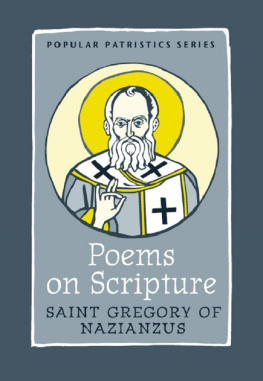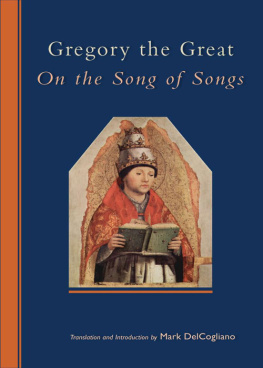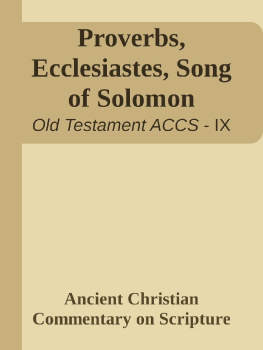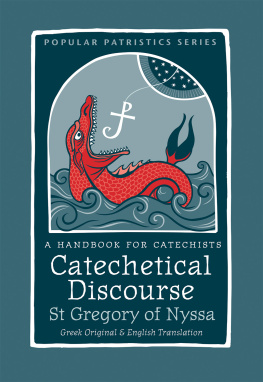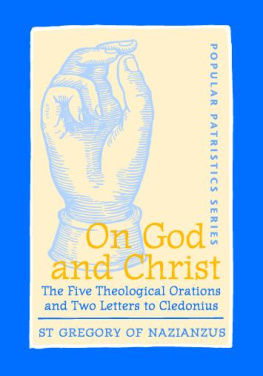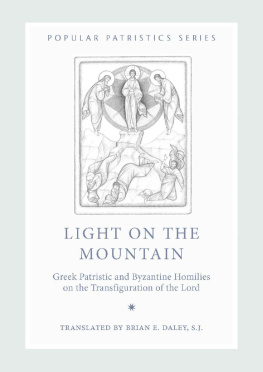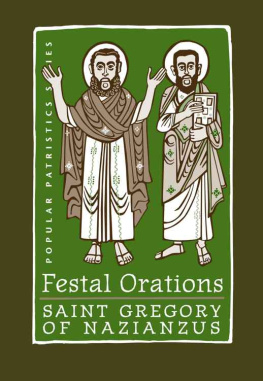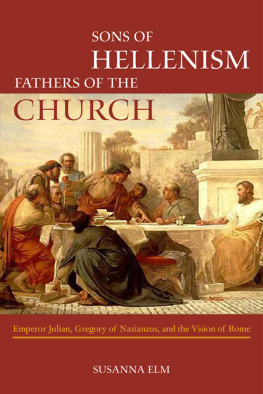Brian Dunkle S.J. - Poems on Scripture: Saint Gregory of Nazianzus (Popular Patristics Series Book 46)
Here you can read online Brian Dunkle S.J. - Poems on Scripture: Saint Gregory of Nazianzus (Popular Patristics Series Book 46) full text of the book (entire story) in english for free. Download pdf and epub, get meaning, cover and reviews about this ebook. year: 2020, publisher: Saint Vlaimirs Seminary Press, genre: Religion. Description of the work, (preface) as well as reviews are available. Best literature library LitArk.com created for fans of good reading and offers a wide selection of genres:
Romance novel
Science fiction
Adventure
Detective
Science
History
Home and family
Prose
Art
Politics
Computer
Non-fiction
Religion
Business
Children
Humor
Choose a favorite category and find really read worthwhile books. Enjoy immersion in the world of imagination, feel the emotions of the characters or learn something new for yourself, make an fascinating discovery.
- Book:Poems on Scripture: Saint Gregory of Nazianzus (Popular Patristics Series Book 46)
- Author:
- Publisher:Saint Vlaimirs Seminary Press
- Genre:
- Year:2020
- Rating:5 / 5
- Favourites:Add to favourites
- Your mark:
- 100
- 1
- 2
- 3
- 4
- 5
Poems on Scripture: Saint Gregory of Nazianzus (Popular Patristics Series Book 46): summary, description and annotation
We offer to read an annotation, description, summary or preface (depends on what the author of the book "Poems on Scripture: Saint Gregory of Nazianzus (Popular Patristics Series Book 46)" wrote himself). If you haven't found the necessary information about the book — write in the comments, we will try to find it.
Brian Dunkle S.J.: author's other books
Who wrote Poems on Scripture: Saint Gregory of Nazianzus (Popular Patristics Series Book 46)? Find out the surname, the name of the author of the book and a list of all author's works by series.
Poems on Scripture: Saint Gregory of Nazianzus (Popular Patristics Series Book 46) — read online for free the complete book (whole text) full work
Below is the text of the book, divided by pages. System saving the place of the last page read, allows you to conveniently read the book "Poems on Scripture: Saint Gregory of Nazianzus (Popular Patristics Series Book 46)" online for free, without having to search again every time where you left off. Put a bookmark, and you can go to the page where you finished reading at any time.
Font size:
Interval:
Bookmark:
st gregory of nazianzus P oems on S cripture greek original and
english translation Translation and Introduction by Brian Dunkle, S.J. st vladimirs seminary press
yonkers, new york Popular Patristics Series
Number 46 The Popular Patristics Series published by St Vladimirs Seminary Press provides readable and accurate translations of a wide range of early Christian literature to a wide audiencestudents of Christian history to lay Christians reading for spiritual benefit. Recognized scholars in their fields provide short but comprehensive and clear introductions to the material. The texts include classics of Christian literature, thematic volumes, collections of homilies, letters on spiritual counsel, and poetical works from a variety of geographical contexts and historical backgrounds. The mission of the series is to mine the riches of the early Church and to make these treasures available to all. Series Editor
John Beh r
Associate Editor
Augustine Casiday 
copyright 2012 by st vladimirs seminary press
575 Scarsdale Road, Yonkers, NY 10707
1-800-204-2665
www.svspress.com
isbn 978-0-88141-435-6 All Rights Reserved For
My Parents
Many thanks to my advisor, Khaled Anatolios, and my reader, Fr Brian Daley, S.J., for their corrections, comments, and encouragement; to Blake Leyerle and Albertus Horsting, who helped me as the initial project expanded; to Fr Joseph T. Lienhard, S.J., whose course in the Cappadocian Fathers some years ago occasioned my first encounter with the Theologians verse; and to Fr John Behr and Fr Benedict Churchill at St Vladimirs Seminary Press for supervising the publication. Last I thank John and Margaret Dunkle, loving parents and careful proofreaders.
His poems, by contrast, are less widely known, although they have recently become the subject of closer study. Gregorys poetic corpus also includes the few instances where Gregory explicitly presents a reading of the biblical narrative. These seventeen scriptural poems, numbered I.1.12 to I.1.28 in Mignes Patrologia Graeca, form the heart of the translation that follows. After a brief overview of Gregorys family background and formation in pagan and Christian culture, I introduce the poems, focusing on their major themes, their catechetical motives, and their literary and theological merit. In addition to the translating these poems, I also include a number of Gregorys poems that reveal his attitude toward Scripture and his techniques for applying the biblical text to his own situation.
Gregorys father was instrumental in most of the major decisions of his life, including his ordination as a priest and then as a bishop (of Sasima in Asia Minor, a seat in which he was never formally installed), and his appointment to the see of Constantinople in 380. Moreover, familiarity with Gregorys background helps one understand the particularly personal nature of his theological project. Because of the many autobiographical references in his writings, Gregorys work is frequently the subject of psychological readings, which find him a sensitive, even self-obsessive, case. At the same time, he often offers his life as a model for his readers to imitate.
He also knew the classical orators, especially Demosthenes, enough to imitate and adapt their language and rhetorical periods in his own speeches. At Athens Gregorys passion for composing literature also matured. In the autobiographical poem On his own life (II.1.11), he records his initial infatuation with writing: While my cheek was still beardless, a passionate love of letters possessed me. Indeed I sought to make bastard letters serve as assistants to the genuine ones. Words, both written and spoken, became Gregorys main preoccupation. More importantly, the quest to employ classical learning in order to articulate Christian thought would occupy the rest of his career.
In his letters, poems, and speeches, Gregory sought to put his classical training at the service of Christian revelation. During his studies, Gregory not only mastered the content of classical learning, but he also acquired classical ways of reading. Gregory learned to engage literature by interpreting it through close attention to the language of the author within the unity of his corpus. A well-trained student deciphered any problematic word, phrase, or passage by locating parallels in the text. Once the student could establish what the author meant in a broader context, he would be better equipped to resolve the ambiguity in the puzzling portion. Gregorys fastidious attention to words emerges from this early training.
Gregorys particular reception of Hellenistic, especially Alexandrian, philological techniques has been the subject of recent study. Even as he appropriated the classical Greek tradition into his writings, Gregory the Christian drew from the Bible as the ultimate source for his rhetoric. He was among the first generation to be formed in a Christian culture that was beginning to supplant the dominant pagan worldview. As Frances Young has documented, despite real ambivalence toward classical authors, Christians did not simply reject Greek paideia, but rather transformed it in order to promote learning based on the Bible. Christian readers applied the same techniques to reading Scripture that they had employed when reading Homer or Demosthenes; the Bible was seen as a unity, which could furnish the attentive reader with all the tools necessary for its own interpretation. Thus, even as he was alluding to Callimachus, Gregory could communicate Christian content in his writings.
It is surprising, then, that despite his thorough engagement with the Bible Gregory has left us virtually no extended scriptural exegesis or commentary. Such a study must engage Gregorys poems on Scripture. Although these verses lack any sustained, penetrating exegesis, they do reveal some of Gregorys basic assumptions in his approach to the sacred text. For their part, these attitudes are informed by Gregorys broader account of his reasons for composing verse in order to do theology. Thus, some background on Gregory the poet will help us understand the motives and techniques that guide his particular contribution to early Christian biblical theology.
Font size:
Interval:
Bookmark:
Similar books «Poems on Scripture: Saint Gregory of Nazianzus (Popular Patristics Series Book 46)»
Look at similar books to Poems on Scripture: Saint Gregory of Nazianzus (Popular Patristics Series Book 46). We have selected literature similar in name and meaning in the hope of providing readers with more options to find new, interesting, not yet read works.
Discussion, reviews of the book Poems on Scripture: Saint Gregory of Nazianzus (Popular Patristics Series Book 46) and just readers' own opinions. Leave your comments, write what you think about the work, its meaning or the main characters. Specify what exactly you liked and what you didn't like, and why you think so.

